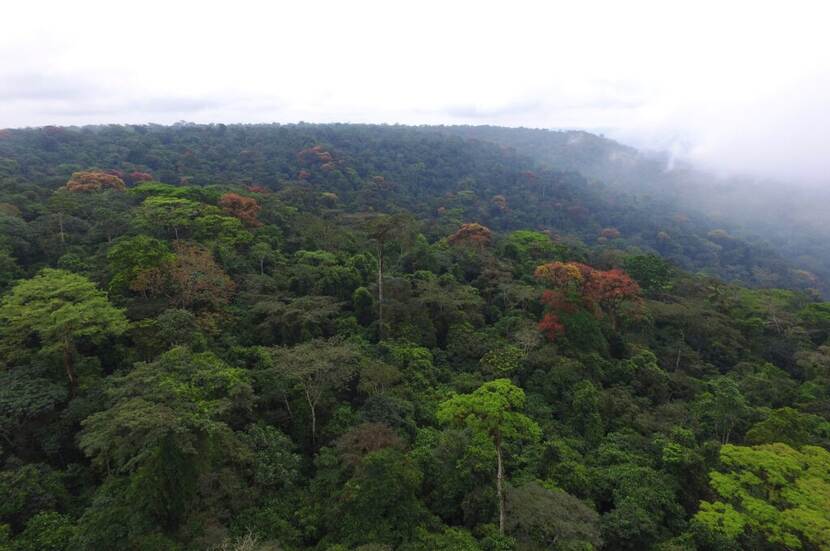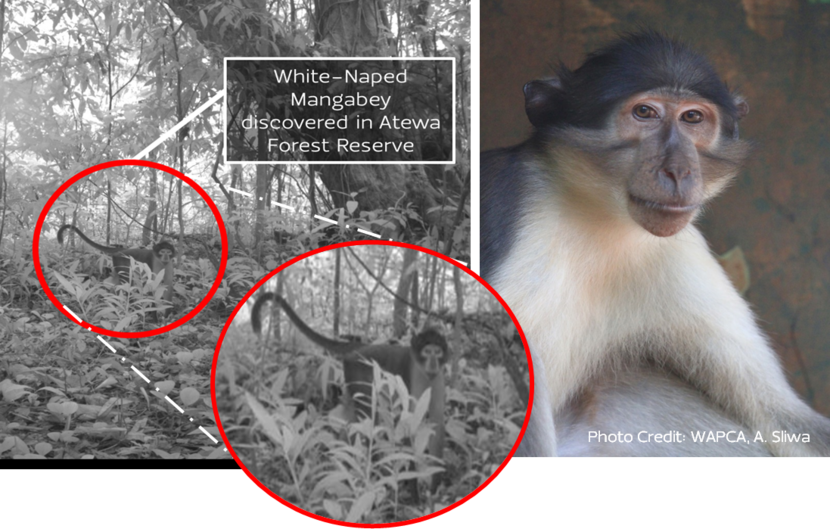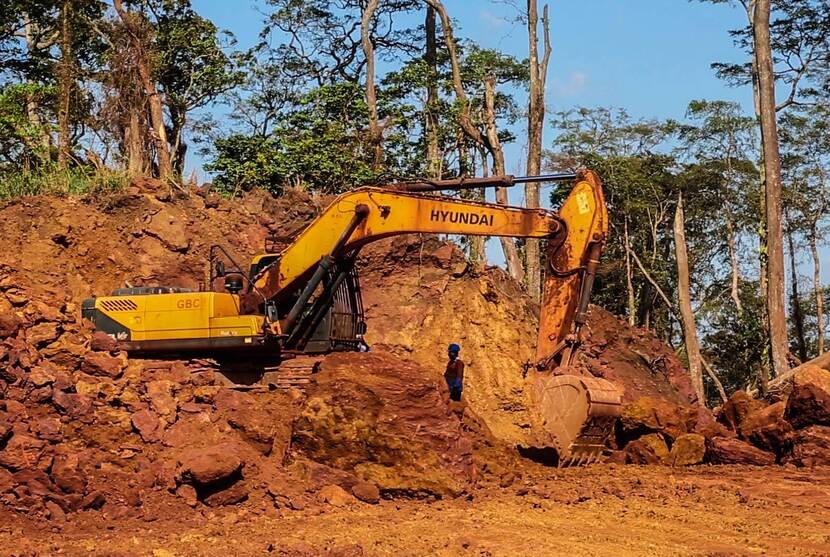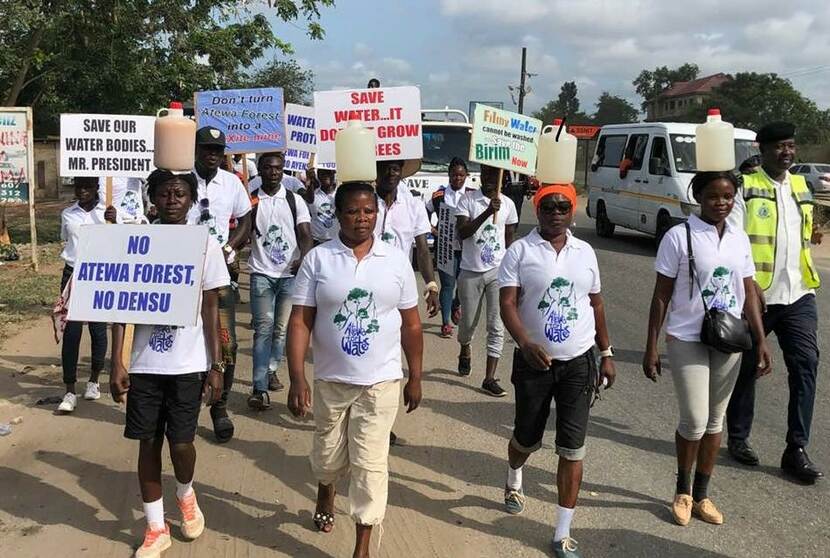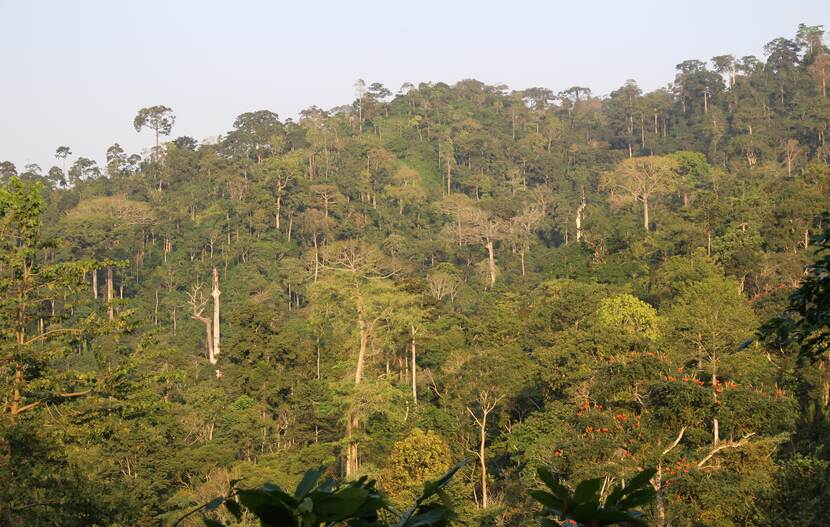Joint battle to preserve Ghana’s Atewa rainforest
On World Environment Day we spotlight efforts to conserve areas of special significance for nature and biodiversity. In Ghana, the Atewa Range Forest Reserve – an area of rainforest – is under threat: the Chinese government wants to mine bauxite there. Seth Appiah Kubi of A Rocha Ghana is fighting to preserve the forest, as over 5 million Ghanaians depend on this region for their water supply. Ron Strikker, Dutch ambassador to Ghana, explains how the Netherlands is supporting this Ghanaian organisation.
Why is it so important to preserve Atewa Rainforest?
Seth: ‘There used to be an expanse of rainforest stretching right from Guinee to Ghana. Only 5% of it is left, including Atewa Forest. The rainforest’s biodiversity is incredible. Some of the animals and plants are unique to this area, like certain butterflies and frogs. There’s a rare species of monkey, too – the white-naped mangabey – which is threatened with extinction. The forest is also important as a source of water. Three major rivers, which fill two vast water reservoirs, have their source in this forest. And around 5 million Ghanaians are dependent on water from the forest, both to drink and for their livelihoods.’
The Chinese government wants to mine bauxite in the forest for aluminium. What impact will bauxite mining have?
Seth: ‘In 2017 a new government was formed. They did a deal with the Chinese government, who will build infrastructure in our country in exchange for bauxite. But the problem is that bauxite is in the top layer of soil. To mine this resource you need to cut down trees and remove the layer of topsoil, effectively destroying the forest. Mining also involves the use of chemicals that pollute groundwater and river water. On top of that, bauxite mining creates a lot of noise and dust. As well as frustration in local communities, because it doesn’t create employment. The miners are usually hired externally.’
What kind of action are you taking to preserve Atewa Forest?
Seth: ‘First of all, we want to raise awareness among Ghanaians. What will it mean if we lose Atewa Forest? To show that, we take people to other areas were bauxite is being mined, so that they can see for themselves what impact it has. We’re trying to reach young people through music. Well-known Ghanaian musicians recorded a video clip. We also staged a six-day walk, carrying water from the river to Jubilee House, the seat of government in Accra. That 95 km trek was reported in the media. Each month we do something to spotlight Atewa Forest. We want to touch Ghanaians’ hearts, so that they fight to conserve nature.’
How are the Netherlands and Ghana working together?
Ron: ‘Since 2015, the International Union for Conservation of Nature (IUCN), Friends of the Earth Netherlands Milieudefensie and Tropenbos International have supported the Ghanaian organisation A Rocha Ghana and other local partners in their efforts to conserve rainforest. Together, these partners are trying to protect the forest against poaching, illegal goldmining and logging to clear land for farming.’
Seth: ‘BZ supports us in various ways, including financially, and helps us to create networks so we can work together. Last year we extended the strategic partnership.’
Over the years, the Dutch embassy has established close links with A Rocha Ghana and other local organisations. What can an ambassador actually do in this context?
Ron: ‘Everyone loves trees, fresh air and clean water. Nature preservation is in all our interests. At the same time, I understand that the Ghanaian government wants to use the country’s natural resources to develop Ghana. In this instance, for the construction of sorely needed infrastructure. Who am I to tell the Ghanaian government that they shouldn’t mine bauxite? After all, in the Netherlands we extract gas from under the ground. What I can do is to help strengthen Ghanaian organisations, so that they can defend their rights themselves. In Ghana, organisations can make their voice heard and take the government to court if they want to fight its plans. The court case against the proposed mining project will be starting shortly. Whatever the outcome is, the fact that it’s possible for a Supreme Court to hear this case is grounds for optimism.’
How likely do you think it is that the bauxite mining can be stopped?
Seth: ‘BMW Group, Tetra Pack and Schüco International have all written to express their concern. These big corporations will not accept bauxite obtained from mining operations that have a catastrophic and irreversible impact on global biodiversity and the water supply. I suspect it helps that this issue is on the radar in other countries. Sometimes European member states ask for information about the rainforest, or famous actors like Leonardo DiCaprio send tweets urging the conservation of Atewa Forest. Partly as a result of such international pressure, bauxite mining hasn’t yet started. We have a strong case: after all, we’re entitled to a clean habitat, aren’t we? Now it’s up to the state to prove you can mine bauxite without destroying Atewa Forest. To date, there’s no evidence of that.’
Ron: ‘You can also mine bauxite in other parts of Ghana, where you don’t need to fell forest.’
What is your future vision for Atewa Forest?
Seth: ‘Bauxite will provide an income in the short term. But in the long term it’s much more lucrative to preserve the forest, by designating it a National Park, which will generate ecotourism. And the forest’s different microclimates are ideal for growing crops like passionfruit and cacao. Ecotourism and small-scale agriculture create employment for the local population without destroying the rainforest for ever.’
